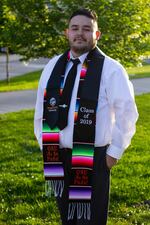The plan was never for Juan Navarro’s family to leave their home in Guadalajara, Mexico. But when he was born with a birth defect that prevented him from being able to walk, his parents felt they had no choice.
“They didn’t have the money to pay for care in Mexico,” Navarro told OPB's "All Things Considered" host John Notarianni. “The doctors told my parents, 'Be prepared to invest in a wheelchair for your son — we can’t help him.’”
Navarro’s parents wanted a better life for their son.
In 1995, they began the long trek to enroll Navarro in a research study at a Portland hospital. He said his mother carried him through the desert for three days.
“She was only 20 years old at the time,” Navarro said. “Imagine a 20-year-old woman carrying a 3-year-old kid through the desert that can’t walk.”
Over the next 12 years, Juan Navarro had six surgeries. He was able to walk for the first time without support when he was 15 years old.

Juan Navarro on graduation day at Oregon State University. His master's thesis was focused on the retention and support of undocumented students in higher education.
Courtesy of Juan Navarro
Today, 23 years after that trek through the desert, he and his family still live in the Salem area. Navarro recently graduated with a master's degree from Oregon State University. His mother manages a restaurant and his father works in a plant nursery. But they’re all still undocumented, which has a big impact on their otherwise ordinary daily routines.
Juan received some legal protections through the Deferred Action for Childhood Arrivals, or DACA, program launched by the Obama administration in 2012. He was able to get a driver's license. But his parents still live — and work, and drive — without one.
That's about to change. Oregon House Bill 2015 eliminates the requirement that a person provide proof of legal presence before getting a driver's license. The bill passed the Legislature this year and awaits the governor's signature.
Advocates say it’s an essential step to make the roads safer and life easier for both immigrant and non-immigrant communities.
For Juan Navarro and his family, the bill represents a bit of freedom from an omnipresent fear.
“Any step outside the house, it’s always a danger,” he said.
Navarro is the oldest child and has learned his parents’ daily schedules by memory, vigilant for any deviations.
“Mom goes to work this day, she comes home around this time. If she doesn’t come home within an hour and a half ... I have to try really hard to get ahold of her to make sure she’s OK. Same thing with my dad," Navarro said.
Having a driver's license will allow his parents to live their daily lives without fearing that a routine traffic stop could spiral into something catastrophic.
With a presidential administration that’s taking an increasingly hard line on immigration, Navarro recognizes there are inherent risks to providing his family’s personal information to the government. But for him, it’s a necessary step.
“Is there a risk in that? Yes, a big risk,” he said. “But the benefits outweigh the risks 100%.
"I have to trust that there’s enough good people to prevent bad people from doing anything worse.”
Soon, when his mother and father head to work, Juan Navarro will be able to be able to rest a little easier. And, he added, laughing: “They’re not going to have their son bugging them about where they’re going all the time.”
Use the audio player above to hear the full conversation from OPB’s “All Things Considered."